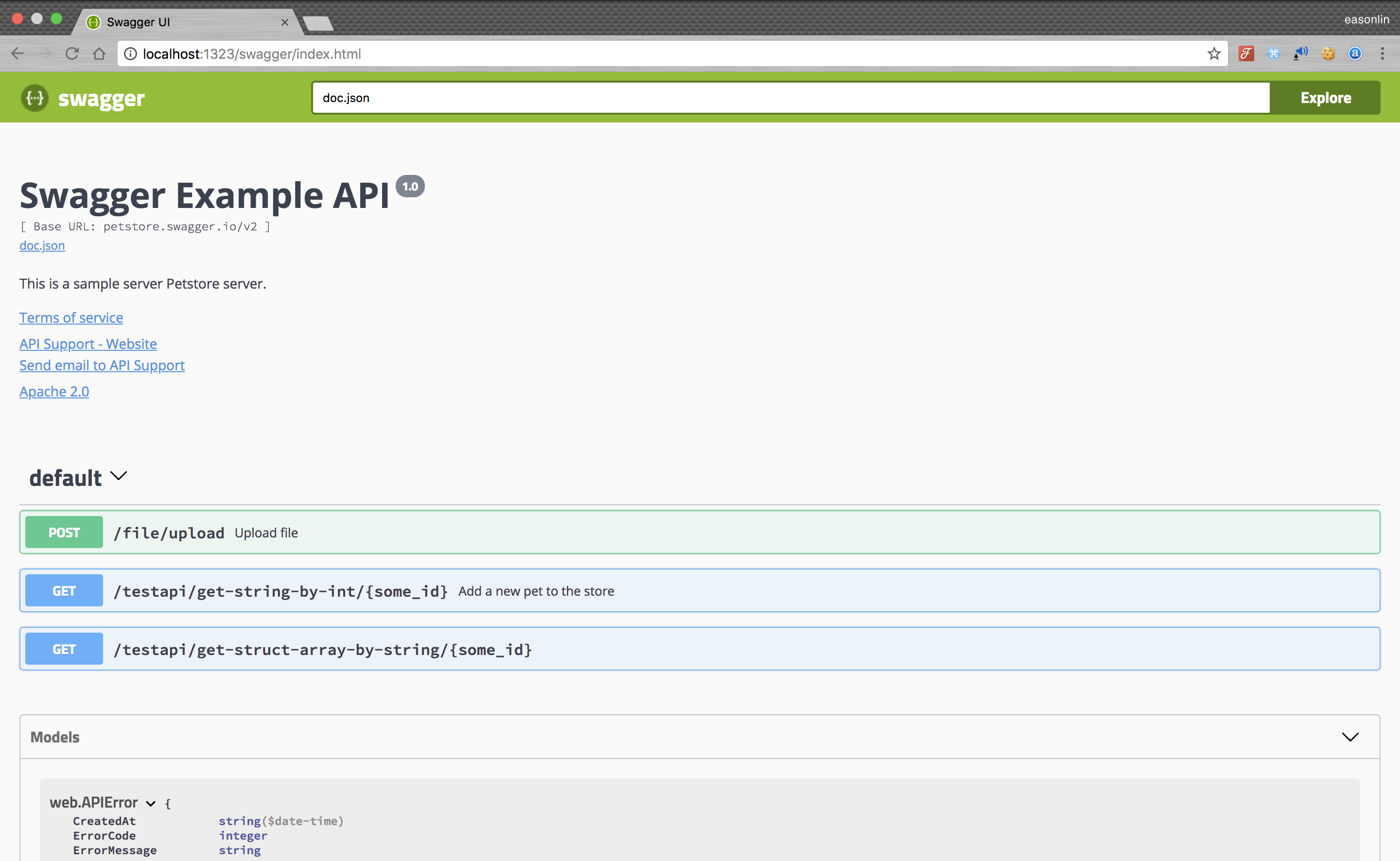forked from ebhomengo/niki
90 lines
2.8 KiB
Markdown
90 lines
2.8 KiB
Markdown
|
|
# echo-swagger
|
||
|
|
|
||
|
|
echo middleware to automatically generate RESTful API documentation with Swagger 2.0.
|
||
|
|
|
||
|
|
[](https://github.com/features/actions)
|
||
|
|
[](https://codecov.io/gh/swaggo/echo-swagger)
|
||
|
|
[](https://goreportcard.com/report/github.com/swaggo/echo-swagger)
|
||
|
|
[](https://github.com/swaggo/echo-swagger/releases)
|
||
|
|
|
||
|
|
|
||
|
|
## Usage
|
||
|
|
|
||
|
|
### Start using it
|
||
|
|
1. Add comments to your API source code, [See Declarative Comments Format](https://github.com/swaggo/swag#declarative-comments-format).
|
||
|
|
2. Download [Swag](https://github.com/swaggo/swag) for Go by using:
|
||
|
|
```sh
|
||
|
|
$ go get -d github.com/swaggo/swag/cmd/swag
|
||
|
|
|
||
|
|
# 1.16 or newer
|
||
|
|
$ go install github.com/swaggo/swag/cmd/swag@latest
|
||
|
|
```
|
||
|
|
3. Run the [Swag](https://github.com/swaggo/swag) in your Go project root folder which contains `main.go` file, [Swag](https://github.com/swaggo/swag) will parse comments and generate required files(`docs` folder and `docs/doc.go`).
|
||
|
|
```sh_ "github.com/swaggo/echo-swagger/v2/example/docs"
|
||
|
|
$ swag init
|
||
|
|
```
|
||
|
|
4. Download [echo-swagger](https://github.com/swaggo/echo-swagger) by using:
|
||
|
|
```sh
|
||
|
|
$ go get -u github.com/swaggo/echo-swagger
|
||
|
|
```
|
||
|
|
|
||
|
|
And import following in your code:
|
||
|
|
```go
|
||
|
|
import "github.com/swaggo/echo-swagger" // echo-swagger middleware
|
||
|
|
```
|
||
|
|
|
||
|
|
### Canonical example:
|
||
|
|
|
||
|
|
```go
|
||
|
|
package main
|
||
|
|
|
||
|
|
import (
|
||
|
|
"github.com/labstack/echo/v4"
|
||
|
|
"github.com/swaggo/echo-swagger"
|
||
|
|
|
||
|
|
_ "github.com/swaggo/echo-swagger/example/docs" // docs is generated by Swag CLI, you have to import it.
|
||
|
|
)
|
||
|
|
|
||
|
|
// @title Swagger Example API
|
||
|
|
// @version 1.0
|
||
|
|
// @description This is a sample server Petstore server.
|
||
|
|
// @termsOfService http://swagger.io/terms/
|
||
|
|
|
||
|
|
// @contact.name API Support
|
||
|
|
// @contact.url http://www.swagger.io/support
|
||
|
|
// @contact.email support@swagger.io
|
||
|
|
|
||
|
|
// @license.name Apache 2.0
|
||
|
|
// @license.url http://www.apache.org/licenses/LICENSE-2.0.html
|
||
|
|
|
||
|
|
// @host petstore.swagger.io
|
||
|
|
// @BasePath /v2
|
||
|
|
func main() {
|
||
|
|
e := echo.New()
|
||
|
|
|
||
|
|
e.GET("/swagger/*", echoSwagger.WrapHandler)
|
||
|
|
|
||
|
|
e.Logger.Fatal(e.Start(":1323"))
|
||
|
|
}
|
||
|
|
|
||
|
|
```
|
||
|
|
|
||
|
|
5. Run it, and browser to http://localhost:1323/swagger/index.html, you can see Swagger 2.0 Api documents.
|
||
|
|
|
||
|
|

|
||
|
|
|
||
|
|
Note: If you are using Gzip middleware you should add the swagger endpoint to skipper
|
||
|
|
|
||
|
|
### Example
|
||
|
|
|
||
|
|
```
|
||
|
|
e.Use(middleware.GzipWithConfig(middleware.GzipConfig{
|
||
|
|
Skipper: func(c echo.Context) bool {
|
||
|
|
if strings.Contains(c.Request().URL.Path, "swagger") {
|
||
|
|
return true
|
||
|
|
}
|
||
|
|
return false
|
||
|
|
},
|
||
|
|
}))
|
||
|
|
```
|